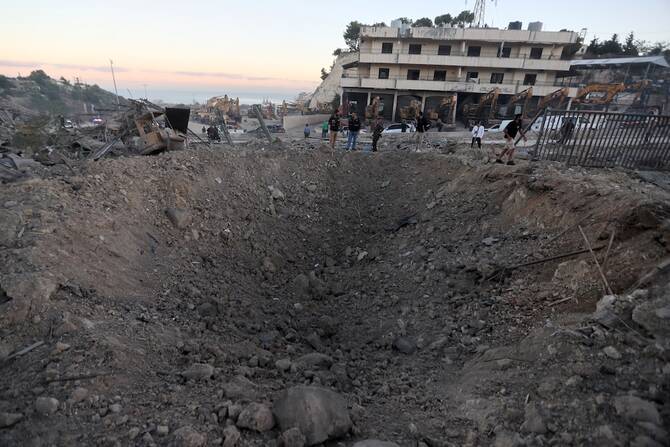
People gather near a crater caused by Israeli airstrikes that targeted a site selling heavy machinery, where a large number of vehicles were destroyed, in the southern village of Msayleh, Lebanon, Saturday, Oct. 11, 2025. (AP Photo/Mohammed Zaatari)
The Libyan prosecutor’s office has announced the detention of two individuals accused of launching a rocket attack on the headquarters of the United Nations Support Mission in Libya (UNSMIL) in the capital, Tripoli.
The Attorney General’s Office confirmed the news on Monday, stating that the two men are now in pre-trial detention as investigations into the incident continue.
The suspects, who were apprehended by the Tripoli Security Directorate, were handed over to prosecutors for questioning.
According to an official statement, the suspects were linked to the attack through material evidence gathered from the scene, with technical verification from the Telecommunications and Information Technology Office confirming their involvement.
Following their interrogation, the magistrate in charge of the case ordered the suspects’ provisional detention pending further prosecution.
The two men have reportedly admitted to being present at the scene during the attack and have responded to the charges against them, as per the statement issued by the Attorney General’s Office.
This incident follows a similar attack attempt in August, when Libyan security forces intercepted a rocket attack on the UNSMIL headquarters in the Janzour district of Tripoli, a western suburb of the city.
At the time, the Ministry of Interior of the Government of National Unity (GNA) revealed that they had foiled the attack after intercepting a Toyota Camry containing two additional rockets and the launcher used in the assault.
The GNA condemned that failed attack as a “dangerous precedent,” particularly as it targeted diplomatic and international missions operating within Libya’s fragile security environment.
The government reiterated its commitment to identifying the perpetrators and understanding their motives.
The attempted assault, along with this latest attack, highlights the ongoing instability in Libya, more than a decade after the fall of Muammar Gaddafi’s regime in 2011.
The United Nations and the international community have repeatedly expressed concerns about the security of diplomatic missions in Libya.
The government has also stressed that such attacks aim to destabilize the country and undermine its relations with global institutions, further complicating efforts for peace and national reconciliation.
As investigations into this latest rocket attack unfold, Libya remains in the grip of a delicate and volatile political and security situation, with the international community closely monitoring the developments.



